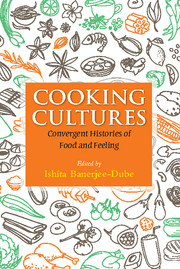Book contents
- Frontmatter
- Contents
- Acknowledgements
- Introduction: Culinary Cultures and Convergent Histories
- Part I Food, Pride, Power
- Part II Cooking, Cuisine, Gender
- Part III Food, Identity, Personhood
- 7 Local Foods and Meanings in Contemporary China: The Case of Southwest Hubei
- 8 From the Market to the Kitchen and Table: Food and its Many Meanings in Dakar
- 9 What is Human?: Anthropomorphic Anthropophagy in Northwest Mozambique
- Part IV Food, Myth, Nostalgia
- Contributors
- Index
- References
9 - What is Human?: Anthropomorphic Anthropophagy in Northwest Mozambique
from Part III - Food, Identity, Personhood
Published online by Cambridge University Press: 05 July 2016
- Frontmatter
- Contents
- Acknowledgements
- Introduction: Culinary Cultures and Convergent Histories
- Part I Food, Pride, Power
- Part II Cooking, Cuisine, Gender
- Part III Food, Identity, Personhood
- 7 Local Foods and Meanings in Contemporary China: The Case of Southwest Hubei
- 8 From the Market to the Kitchen and Table: Food and its Many Meanings in Dakar
- 9 What is Human?: Anthropomorphic Anthropophagy in Northwest Mozambique
- Part IV Food, Myth, Nostalgia
- Contributors
- Index
- References
Summary
Introduction
The labelling of fellow humans as ‘cannibals’ is a trope employed by people across the globe, often in an effort to cast doubt on the humanity of detested neighbours or the mysterious inhabitants of distant lands. A well-documented example is that of European explorers and colonialists describing as man-eaters the people they encountered around the world in the eighteenth and nineteenth centuries, predominantly based on hearsay. The connotations of primitivism, brutishness and violence neatly bolstered the Global North's efforts to plunder, settle and ‘civilise’ the Global South (Fieldhouse, 1995). But charges of consuming human flesh were also levelled in the opposite direction. Scholars document with particular acuity African fears of Europeans feeding on human blood and flesh, an allegation some interpret as anxiety over the commodification of African bodies in the trans-Atlantic Slave Trade (Shaw, 1997), and others explain as a fear emerging from misunderstandings of actual historical events (Lewis, 1996). Africans have also long accused one another of cannibalism, typically as a metaphor for predation (Arens, 1979). Such rumours bolstered European fears and claims about the ‘Dark Continent’ in the colonial era.
This chapter is concerned with the use and the avoidance of cannibalism as practices that establish difference and belonging in Africa south of the Sahara. I take as my starting point the fact that many populations across Africa associate sorcerers and witches with both anti-sociality and with the consumption of human flesh. My interest is in the ramifications of these correlations for food taboos, and the role of these proscriptions in the construction and maintenance of individual personhood. Specifically, where achieving social personhood requires acting in a compassionate, self-abnegating manner, and where man-eating as a matter of gustatory preference is a defining trait of a caste of individuals (witches and sorcerers) whose insular orientation marks them as existing beyond the realm of humanity, those who wish to avoid accusations that call into question their identity as a person must make clear that they are uninterested in the consumption of human flesh.
In Metangula, a Nyanja (Maravi) town in northern Mozambique, I found that the connection between food, affect and personhood has manifested in a series of prohibitions against not only cannibalism (as all societies have), but also the eating of animals resembling human beings in physical, emotional and spiritual form.
- Type
- Chapter
- Information
- Cooking CulturesConvergent Histories of Food and Feeling, pp. 177 - 198Publisher: Cambridge University PressPrint publication year: 2016
References
- 2
- Cited by



